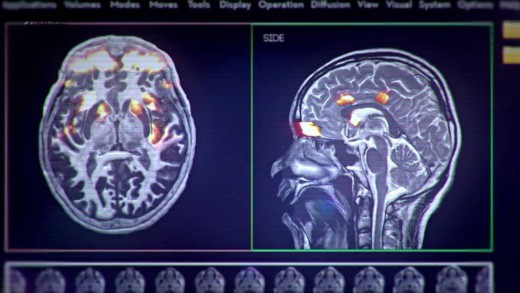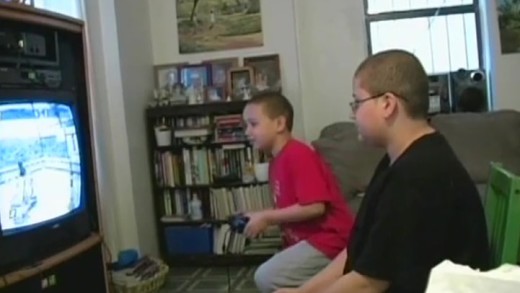Martin Daubney walks away from his position as editor of a renowned porn magazine after becoming a father. With his son, now four years old amongst the confusion by contradictory headlines, and driven by the knowledge that his boy will soon reach the age at which most children first see porn--10 years old--Daubney wants to find some answers. How does pornography effect kids? Where is the evidence? Porn on The Brain takes us through the journey, and Daubney discovers that porn has changed from what he remembers as a teenager--today's porn is extreme, it's free, it's pervasive and only one click away, and Daubney is shocked by the content. Porn on The Brain reviews internationally-renowned neuroscientists, leading therapists and educators who are all concerned about the effects on vulnerable teenage brains today of free and easy access to hardcore pornography. The film includes the shocking results of a specially-commissioned survey of teen porn habits, conducted for the documentary by the University of East London; and collaborates with the University of Cambridge to conduct the first study of its kind, scanning the brains of men who feel they are addicted to porn. When will we acknowledge that there is a problem?
One generation from now, most people in the United States will have spent more time in the virtual world than in the natural world. New media technologies have changed lives in countless ways. Streams of information now appears in a click. Overseas friends are contactable in an instant. Engulfing video games and streams of endless entertainment to stimulate the senses, dazzle the mind and pander to the acculturated desire to be in control. Even grandma loves Wii. But what are people missing when they're behind screens? How is it already impacting our children, our society, and the planet? At a time when people are at screens more than they are outside, Play Again explores the challenge in dealing with the addiction and returning to the real world...
How do our families influence our relationship with our own bodies? How does popular culture's standards of beauty get inside our hearts and heads? In what ways can sport and the drive for fitness actually make us sick rather than healthy? In Beauty Mark, former champion triathlete Diane Israel examines this culture's unhealthy fixation on thinness, beauty, and physical perfection. She talks candidly about her own struggle with eating disorders and obsessive exercising, confronting her own past to come to terms with this culture's unhealthy fixation on self-destructive ideals of beauty and competitiveness.
Once relegated to the margins of society, pornography is now the most pervasive and visible aspect of popular culture, assuming an unprecedented role in media as its content becomes more harsh and extreme, racist and abusive. This eye-opening and disturbing film moves beyond frivolous "liberal versus conservative" debate and tackles the real issues surrounding pornography by placing the voices of performers themselves, producers and critics directly alongside the observations of women and men as they candidly discuss the role porn has played in shaping their sexual imaginations and relationships. The Price Of Pleasure reveals a nuanced portrait of how pleasure and pain, commerce and power, freedom and responsibility have become extremely twisted by popular culture, usurping the most intimate area of our lives.
Pornography is now more easily accessible than ever before--it's a click away on the internet. And many men are finding their everyday relationships in impacted because of their porn addiction. This documentary examines the problem and explores growing evidence that there is a chemical basis in the brain for the condition, related to dopamine, uncovering the human costs of porn addiction along the way. The film follows some real life examples of people battling their addiction, as well as reviewing some cases where addiction has unravelled with tragic results. But as with any addiction, the good news is that it can be turned around...
The average child in the United States spends 40+ hours per week consuming media—the equivalent of a full-time job. This means that by the time children born today turn 30, they will have spent an entire decade of their lives in front of a screen. Remote Control examines the implications of this unprecedented level of exposure by showing the media habits of two families and supplementing their personal insights with interviews from media experts and educators. Revealed is the centrality of media in our lives and far-reaching effects that we are only beginning to understand, as well as ways we might begin to help our children live a life instead of watching one.
Through powerful insider information, Pack of Lies reveals the deception of the tobacco industry's claims that they do not seek to addict children to nicotine. The film provides important analytical background. Jean Kilbourne is a nationally recognized researcher and lecturer on media, advertising, and health issues. Rick Pollay teaches advertising and marketing management at the University of British Columbia, and has been an expert witness in trials involving the tobacco industry. They team up to provide important insights on the power of advertising dollars to counter the influence of scientific research, to affect news coverage, and to put private profit ahead of public health.
The combination of detailed descriptions by abused women and great dramatisations helps both male and female viewers to understand the realities of spousal abuse, what motivates this kind of activity, and reveals the myths that surround it. Low self-esteem, rather than straight anger, is the central causal issue and the ability to quit habitual spousal abuse is as problematic as recovery from any other addiction.







